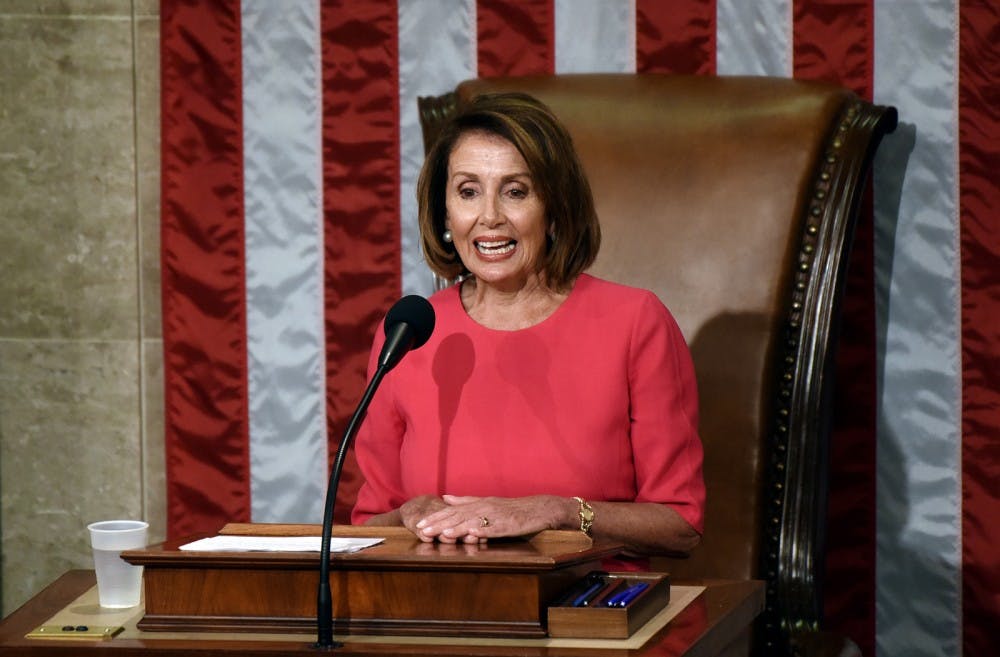Nancy Pelosi was elected Speaker of the House this past week, but not without some noticeable defections within her own party.
I was initially deeply skeptical of Nancy Pelosi becoming the Speaker of the House again. I thought she wouldn’t have enough progressive or conservative support, that significant sectors of the party were tired of the same old leadership and the subsequent splintering of Democrats would hurt the party more than help it going into divided government.
My skepticism was unfounded. It was rooted in the promises made during campaign season by folks on the progressive and more moderate wings of the party.
I saw Rep. Alexandria Ocasio-Cortez, D- N.Y., challenge the leadership of the party from the left and win, and I saw more moderate Democrats like Reps. Conor Lamb, D-Penn., and Joe Cunningham, D-S.C., challenge Pelosi from the right to their success.
What I underestimated was Pelosi’s ability to garner support for her agenda. The most serious challenge to Pelosi’s speakership came from Rep. Seth Moulton, D-Mass., who originally tried to push for Rep. Marcia Fudge to run for Speaker.
Sure enough, however, Pelosi secured an endorsement from Fudge, and reached a deal with Moulton to limit her speakership to four years in exchange for his support.
By Jan. 3, it was all but certain that Pelosi would be elected speaker, but I was curious what the breakdown would be. Would the Blue Dogs honor their campaign promises? Was Ocasio-Cortez going to defect in front of the entire party?
Fifteen Democrats defected and did not support Pelosi’s speakership. I won’t knock them for that, they followed through on promises made to constituents during the campaign. Blue Dogs and conservative Democrats speak for an important part of the Democratic base and should be adequately represented.
That’s not my issue with these defectors. My issue is who these representatives put forward instead of Pelosi. Anti-Pelosi congressmen put forward eight different candidates, none receiving more than five votes in support.
Moreover, four of the candidates nominated, Reps. Joe Kennedy III, D-Mass., Marcia Fudge, D-Ohio, Cheri Bustos, D-Ill., and John Lewis, D-Ga., themselves supported and voted for Pelosi to be the next speaker.
So what did Lamb actually accomplish by nominating Kennedy III to be speaker? Yes, he checked off a box on the list of campaign promises he made, but did he put forward a viable option? No.
My issue with Lamb, Cunningham, Rep. Abigail Spanberger, D-VA., and all the other Democrats that defected is not their politics. I like that Lamb moved to the right to win his election, and I am glad it helped candidates like Cunningham and Spanberger in 2018. My issue lies in these member’s failure to put forward a viable alternative.
Instead of making an effort similar to Moulton’s, these defectors simply voiced their opposition to their voters and when it came time to select an alternative, threw out names of people that ended aligning with Pelosi.
If Democrats needed to win by disavowing Pelosi and it worked, then more power to them and more so if they keep that promise after being elected. But what good is that promise if your vote is meaningless?
I would be more understanding of these defectors if all 15 of them came together in support of a candidate, thus creating a faction within the party that might command some influence going into the 116th Congress. Instead, these members put up an array of names as if to just say “anyone but Pelosi.”
Anyone but Pelosi is a great campaign strategy, but like most campaign ideas, it didn’t translate so well in practice when the lights came on in Washington.
Instead of making a statement against the incoming speaker, those opposed to Pelosi looked like the freshman congressmen they primarily were — disorganized, juvenile and severely outnumbered by the majority of the Democratic Caucus.






